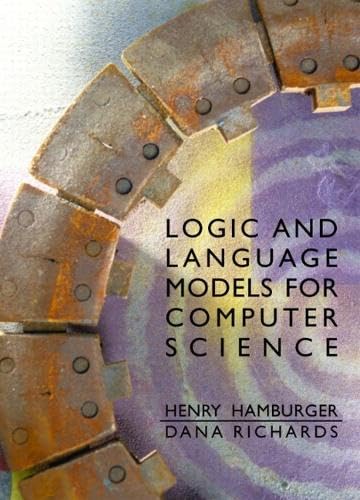
Synopsis
This text makes in-depth explorations of a broad range of theoretical topics in computer science. It plunges into the applications of the abstract concepts in order to confront and address the skepticism of readers, and instill in them an appreciation for the usefulness of theory. A two-part presentation integrates logic and formal language—both with applications. Chapter topics cover mathematical preliminaries, propositional logic, proving things: why and how, predicate logic, proving with predicates, program verification, logic programming, language models for computer science, language models, finite automata and their languages, regular expressions, Lex: a tool for building lexical scanners, context-free grammars, pushdown automata and parsing, and turing machines. For future computer scientists.
"synopsis" may belong to another edition of this title.
About the Author
Henry Hamburger is a Professor and Chairman of the Department of Computer Science at George Mason University.
Dana Richards is an Associate Professor with the Department of Computer Science at George Mason University.
From the Back Cover
This book invites the reader to explore abstractions that are crucial to computer science. The authors bring a sense of excitement to logics, formal languages and automata—motivating topics by linking them to computing and to computational applications, sometime with whole chapters. They achieve exceptional clarity through a plethora of examples and figures, yet without-losing sight of, and indeed celebrating, the precision that is the hallmark of this subject matter.
Features of the book include:- application of logic to program verification
- programming in the logic language, Prolog
- discussion of "why" and "how" to prove things
- relationships between English and programming languages
- diagrams-first approach to automata
- lex as a tool and an extension of formal language
- pushdown automata as parsing strategies
- Turing machines as models of computation
"About this title" may belong to another edition of this title.
Other Popular Editions of the Same Title
Search results for Logic and Language Models for Computer Science
Logic and Language Models for Computer Science
Seller: ThriftBooks-Dallas, Dallas, TX, U.S.A.
Paperback. Condition: Very Good. No Jacket. Former library book; May have limited writing in cover pages. Pages are unmarked. ~ ThriftBooks: Read More, Spend Less. Seller Inventory # G0130654876I4N10
Logic and Language Models for Computer Science
Seller: Better World Books Ltd, Dunfermline, United Kingdom
Condition: Good. 1st. Former library copy. Pages intact with minimal writing/highlighting. The binding may be loose and creased. Dust jackets/supplements are not included. Includes library markings. Stock photo provided. Product includes identifying sticker. Better World Books: Buy Books. Do Good. Seller Inventory # 47817860-20
Buy Used
Ships from United Kingdom to U.S.A.
Quantity: 1 available
Logic and Language Models for Computer Science
Seller: Phatpocket Limited, Waltham Abbey, HERTS, United Kingdom
Condition: Good. Your purchase helps support Sri Lankan Children's Charity 'The Rainbow Centre'. Ex-library, so some stamps and wear, but in good overall condition. Our donations to The Rainbow Centre have helped provide an education and a safe haven to hundreds of children who live in appalling conditions. Seller Inventory # Z1-G-012-02186
Buy Used
Ships from United Kingdom to U.S.A.
Quantity: 1 available
Logic and Language Models for Computer Science
Seller: Your Online Bookstore, Houston, TX, U.S.A.
Paperback. Condition: New. Seller Inventory # 0130654876-11-23947307
Logic and Language Models for Computer Science
Seller: SHIMEDIA, Brooklyn, NY, U.S.A.
Condition: New. Satisfaction Guaranteed or your money back. Seller Inventory # 0130654876
Logic and Language Models for Computer Science
Seller: BennettBooksLtd, Los Angeles, CA, U.S.A.
paperback. Condition: New. In shrink wrap. Looks like an interesting title! Seller Inventory # Q-0130654876
Logic and Language Models for Computer Science
Seller: Antiquariat Bernhardt, Kassel, Germany
Condition: Sehr gut. 01. XIV, 341 Seiten, Zust: Gutes Exemplar. Mit Vorbesitzereintrag. Schneller Versand und persönlicher Service - jedes Buch händisch geprüft und beschrieben - aus unserem Familienbetrieb seit über 25 Jahren. Eine Rechnung mit ausgewiesener Mehrwertsteuer liegt jeder unserer Lieferungen bei. Wir versenden mit der deutschen Post. Sprache: Englisch Gewicht in Gramm: 706 gebundene Ausgabe gebundene Ausgabe. Seller Inventory # 492652
Buy Used
Ships from Germany to U.S.A.
Quantity: 1 available


